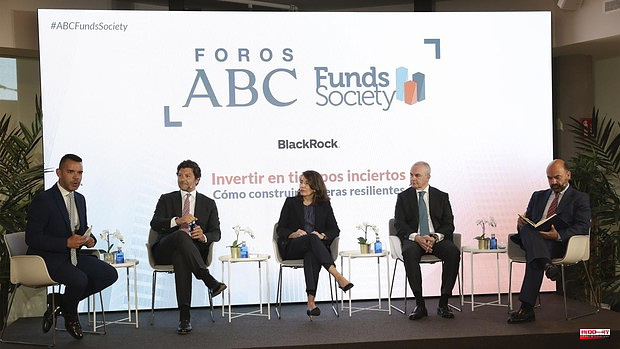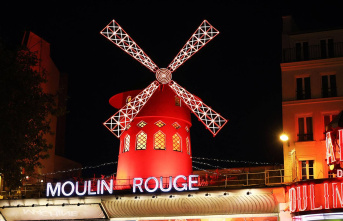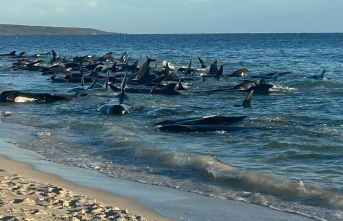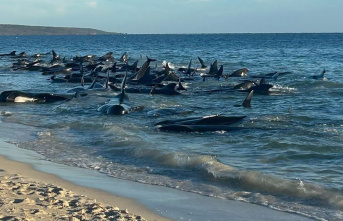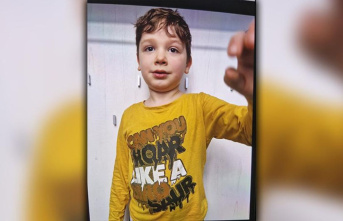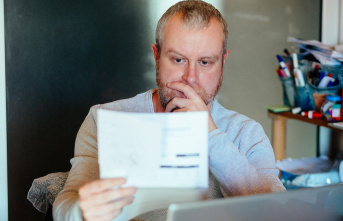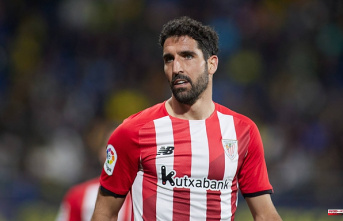The current war in Europe, the Covid outbreaks in China or high inflation are some of the reasons that explain the high volatility that exists in the markets. In this context of uncertain times, there are many factors to take into account to know where to invest and build a robust portfolio. We also start from a certainty, "that whoever has money loses purchasing power if they do not invest it", as André Themudo, head of the distribution business and fund managers for BlackRock in Iberia, recalled this morning during the ABC-Funds Society Forum , sponsored by said firm.
From BlackRock they show their concern about the position that central banks are going to adopt to combat inflation.
"There is a risk of raising rates soon, more than the economy can bear," Themudo said. For this reason, he believes that it makes sense to invest in equity vs. fixed income funds "but with a lot of analysis". From this investment company, when it comes to investing in equities, they bet more on North American companies that have a dominant position in the sector in which they operate and if it is in fixed income, they look for quality European proposals. «The volatility is here to stay, but there are many opportunities in the market. You have to be very selective, it's not like 2021 where everything worked," warns the head of the firm.
Marta Raga, Director of Discretionary Management at Singular Bank, has recalled that being in a bear market does not mean that investors should leave. "There is significant risk from China's growth and there is the possibility of a financial shock, but there are opportunities." She has spoken of a diversity of sectors, with some growing a lot, such as energy, but at the same time with the FAANG shares (Facebook, Amazon, Netflix, Google and Apple) that in some cases have fallen by 30%. “There are a large number of rotations and you have to take advantage of it, but the problem is that you can put the money in the wrong place. It is important to have a balanced portfolio, get out of everything that has a very high valuation and go for those trends that are more resistant to the change of the cycle », advises Raga.
For his part, Juan Luis García Alejo, CEO of Andbank Wealth Management SGIIC, pointed out that "the crises of the last 50 years are part of the financial reality." Bearing in mind that there is a feeling that the market is pricing in a high probability of a recession, "we must be cautious and choose what seems good to us." If we talk about more conservative assets, which have performed very poorly with falls even in double digits in some segments, "we are beginning to see that interest rates along the curve could be beginning to peak in nominal terms". For this reason, he advises forming a portfolio in fixed income with a short duration where quality is above anything else». Now if we talk about equities, “you have to play between styles, factors and geographical areas. In the long term, we think of mixed portfolios with a predominance of value bias. Balanced portfolios, oriented to the years in which we will come », he points out.
“There has been a paradigm shift. The free liquidity bar that the banks left us for 15 years has been eliminated. We are in a very different scenario”, Carlos Andrés Poyo, director of Management and Advice at Banca March, began by pointing out. Faced with so many changes, we must act differently and “our portfolios are more cautious, waiting for opportunities, but we are not going to run away. We try to build portfolios for tomorrow and there are many opportunities in the market."
One of the great challenges in the financial world is to convince savers to invest in their products. “That you bet on diversification, that you mix investments. A very conservative investor will surely have to raise his risk profile to recover," Poyo pointed out. In recent years there has been a change in mentality, "the client already understands that he must pay for the banker's service and is more demanding". And now the sector faces another change that will come into force on August 2. As of that date, marketers of financial products will have the obligation to ask clients, by means of an suitability test, if they have any preference in terms of sustainability when choosing their investment products. "The industry has adapted to the changes in the regulator, to some very changeable years," he stressed.
André Themudo notices that customers behave more slowly and calmly than 5-10 years ago. At an institutional level, “they are increasing their investments in alternative assets. Come longer term. There is also an appetite and demand for ESG assets.” As for individual clients, for those who started investing recently "it's been a bad experience if you look at the short term." The profile in Spain is more conservative and those who are suffering losses of 10% "are already thinking of moving to something more risky to recover." He has also pointed out that after the sharp falls in the markets due to Covid, the private client has learned a lot and "massive exits are not taking place."
Marta Raga, for her part, distinguishes between two situations, the current one and the long-term one and the current situation, "we see a behavior that reacts well to the fall of the market and another that does not want to invest in fixed income because it accumulates falls and profitability is low. It is a difficult moment. The individual customer is nervous." As a consequence of this situation, the client becomes more sophisticated and “comprehends the global portfolio approach in such a way that it has a broader perspective. Every time there is a greater shift towards the risk asset ». From Singular Bank they are committed to providing a differential service to the traditional service, "being very close to the client and uniting it with digitization", a means that does not replace humane treatment but does help in the process.
«We see a more informed and interested client who demands and demands based on that knowledge. It is a client that also demands assets of an illiquid nature”, acknowledged the general director of Andbank Wealth Management SGIIC. Illiquid assets allow your long-term portfolio mix to have a somewhat higher return. “And you have very different things to choose from, such as infrastructures, private equity, schools…”, he pointed out. In addition, the client has his long-term return roadmap which allows him to "think more about investments".
Attendance at this meeting will be valid for 1 hour of training for EIA, EIP, EFA and EFP recertification after passing an active test on the intranet of the EFPA Spain website. The test, which can be found at this link, will be active until the day after the event, at 12 noon.
2

